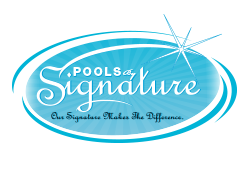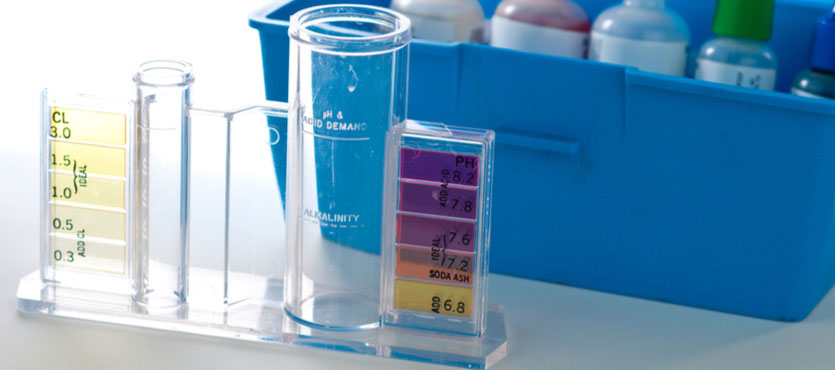By regularly testing your pool water chemistry you can maintain a safer pool for swimmers, while promoting the longevity of pool equipment and materials.
There are four main things to test for:
- pH levels
- Chlorine/free chlorine levels
- Total alkalinity
- Calcium or water hardness
It is important to check your pool water chemistry for several fundamental reasons:
- To help prevent the spread and transmission of bacteria and diseases that thrive in un-sanitized pool or spa water.
- To prevent high chlorine levels, which can damage swimsuits, pool toys; cause eye and skin irritation, as well as respiratory issues.
- Increase longevity and reduce damages to pool features, equipment, and materials.
Testing Your Pool Water Chemistry for Chlorine Levels
Chlorine is one of the most important things to test for, as it is responsible for killing off bacteria and viruses commonly found in pools. Everything from urine to fecal matter ends up in swimming pools, and chlorine is a great way to kill off bacteria before it has a chance to make someone sick.
Free chlorine is the chlorine in your pool water that has not reacted with contaminants yet, therefore it is “fresh.” It’s important to test for free chlorine because too much or too little can lead to issues for swimmers, as well as for your pool. The ideal range is somewhere between 1.5 to 2.5 ppm.
Lack of chlorine can lead to:
- Algae growth in your pool and on pool equipment
- Cloudy water that is polluted with sunscreen, makeup, dirt and debris, etc.
- Water-borne diseases can thrive, increasing the risk for transmitting illness or disease.
Too much chlorine can be more dangerous than too little chlorine. Potential drawbacks to an over chlorinated pool include:
- Burning eyes, skin rashes, and other irritations
- Harsh fumes can irritate lungs
Testing Your Pool Water Chemistry for pH Levels
pH levels stand for the total acidity of pool water and are measured on a scale of 1 to 14. Your pool should be in the middle, around 7.3 to 7.7 ppm—anything under 6 indicates acidity, and anything over 8 represents alkalinity. The in-between zone is considered neutral and ideal.
Low pH levels lead to:
- Irritation of the eyes and skin
- Pool equipment is more likely to become damaged
- Increased risk of corrosion of ladders, rails, and other metal pool accessories
- Parts of the pool heater are more prone to corrosion
High pH levels lead to:
- Reduced effectiveness of free chlorine
- Unsanitary pool conditions
- Cloudy water
- Irritation of the eyes and skin
Testing Your Pool Water Chemistry for Total Alkalinity (TA)
Total alkalinity is the alkaline substances in your pool, which should be between 90 and 120 ppm. A good TA level keeps the pH level neutral.
Low TA levels can cause:
- Murky, dark water
- Burning eyes and other irritations
- Corrosion of pool equipment and accessories
High TA levels can cause:
- Algae growth
- Bacterial growth
- Irritation of the eyes and skin
Testing Your Pool Water Chemistry: Calcium Hardness
Pool water can be hard, soft, or right in the middle—which is where you want to be.
Low levels lead to:
- Water absorbing the calcium from pool plaster, which leads to pitting of pool walls. This is a common cause of many of our resurfacing jobs. Keeping sufficient calcium in the water is essential to avoid costly repairs.
High calcium levels lead to:
- Calcium deposits that result in gray, white, or brownish scaling on the interior surface of your pool.
How to Test Pool Water Chemicals
Test strips are not the most reliable way to check pool water chemistry. Other at-home tests often produce misleading results as well. In addition, while the chemicals in your pool should be safe, they are still chemicals with the potential to cause harm when misused. Hiring a professional pool service to test and balance your water chemistry is a great way to keep your pool clean and safe.
Pools By Signature offers pool water chemistry testing as part of our full list of pool services. Contact us today to learn more!

